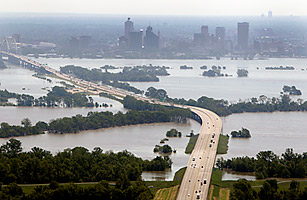
After weeks of storms and floods, Memphians awoke Tuesday morning to the highest river they’d seen in 74 years. The Mississippi had risen to 48 ft. ; 120 million cu. ft. of water rushed by every minute — enough to fill a football field 44 ft. deep every second. By May 10, the river had swelled to six times its normal girth, more than 3 miles across at Memphis.
But much of the city remained largely untouched by the creeping water, and its residents had clearly grown weary of staring suspiciously at it. Along the banks of the flood-ravaged Mud Island Tuesday morning, the pleasure boats returned to the bloated Mississippi.
This, of course, was the opposite of what the authorities were recommending. “We do not consider these waters recreational,” lectured Bob Nations, the head of the Memphis/Shelby County Emergency Management Agency, at a press conference earlier that morning. “We do not consider these waters healthy. They are dangerous.” Though mostly snow and ice melt and rain, the waters have flooded farm fields treated with dangerous pesticides and overrun sewers and industrial plants.
Still, they hadn’t banned pleasure craft from the river, so I decided to take a ride. Memphis’ waterfront looked “like a California beach walk times 10,” said Mark Bills, owner of Uptown Carriages in Memphis. Bills and two other horse-drawn carriage drivers, Lissie Mullen and Shannon Bryan, were taking the day off to sightsee in the city they were all born and raised in: their first airboat ride on a river they’d lived next to for more than century combined. Thousands of tourists — mostly locals like these three — paraded up and down the raised trolley rails over the flooded Riverside Drive. Hawkers sold water, ice and beer. A couple of enterprising salesmen peddled T-shirts reading “I Survived the Flood of 2011” and “2011: The Flood of the Century.” “I feel like a kid, this is so exciting,” Mullen said, buying souvenirs ahead of the outing at the Memphis Riverboat tourist shop. A crowd formed as Captain William Lozier piloted the Demona, named for his wife, to the pier. “Hey, can you rent those things?” asked a woman with a baby. “Yes, for $30 the half an hour,” Lozier said, before adding, “but I don’t take babies, kids or pregnant ladies.”
Demona had no seatbelts — “so we don’t drown if we flip,” quipped Bryan cheerfully. Airboats are tiny crafts that seat six and use a giant fan to propel the shallow boats across the surface of the water. Passengers must wear glasses — bugs smashing into your eyeball at high speeds can be painful — and ear plugs, the giant kind worn by workers on airport runways. “If you care about your hearing, you’ll wear them,” Lozier advised. The four of us buckled into life jackets and scrambled aboard, jockeying for the front seat. I lost, but was ultimately glad I did as Bryan and Mullen ended up soaked.
The rushing river did seem a little daunting, but the airboat seemed to flit above it — as it did the occasional grassy knoll the Lozier playfully swerved up against. “What people don’t understand is that it’s so spread out that it’s not much different from regular currents,” Lozier says. Several school groups have canceled riverboat tours because of what parents perceive as dangerously high waters. We skimmed over the submerged grounds of an amusement park on Mud Island and raced straight across the heaviest currents toward Arkansas on the far bank, where the water sprawled like a lake for miles.
The day was already warm — 85F at 11:30 a.m. I shuddered to imagine Memphis’ coming mosquito plague when all this water settled into small lakes, then ponds, then large puddles — slowly evaporating over the summer.
We paralleled Interstate 40 for more than a mile; the Mississippi usually spans just half a mile there. Drivers rubbernecked to take pictures of us, surprised to see a boat so close, as we dodged semisubmerged billboards, telephone poles and what was not long ago a weigh station for trucks. We took pictures of the drivers taking pictures of us. We passed what was left of a trailer park. The water had swept the RV’s from their homes and wedged seven of them beneath an overpass. The road was slightly elevated — built to withstand exactly this event — but that also meant that we could weave under the pylons every few hundred yards.
The water smelled dully like a sewer with a side of chemical plant, a bit like Arabi in New Orleans, where the floodwaters mixed with an oil slick after Hurricane Katrina. I was reminded more intensely of how much I’d rather not take a swim just as we hit the wake of a motorboat and flew up like kids on the back seat of a school bus on a bumpy road.
We turned south after a while and played hide-and-seek with a railroad bridge and Interstate 55 before looping northward back to Memphis. The city’s famous Pyramid arena — a massive 20,000-person venue with shiny glass sides — reflected the sun. Tourists waved at us from Tom Lee Park and an annoyed television correspondent waved us quickly out of his shot. After all, how serious could a natural disaster be if he had airboats on the water behind him? Lines of white television trucks lined the waterfront, and more river gawkers waved from the elevated trolley platform above.
As we pulled in, a crowd again formed. Lozier told onlookers where to buy tickets. A salesman was advertising the 2:30 riverboat cruise. After weeks of tornadoes, torrential rains and then the rising Mississippi, business has been bad. But as the fear of flooding wanes, judging by the crowds that were lining up for boat tours, Memphians are again embracing their mighty river.
See photos from the aftermath of the April storms.
See TIME’s Pictures of the Week.